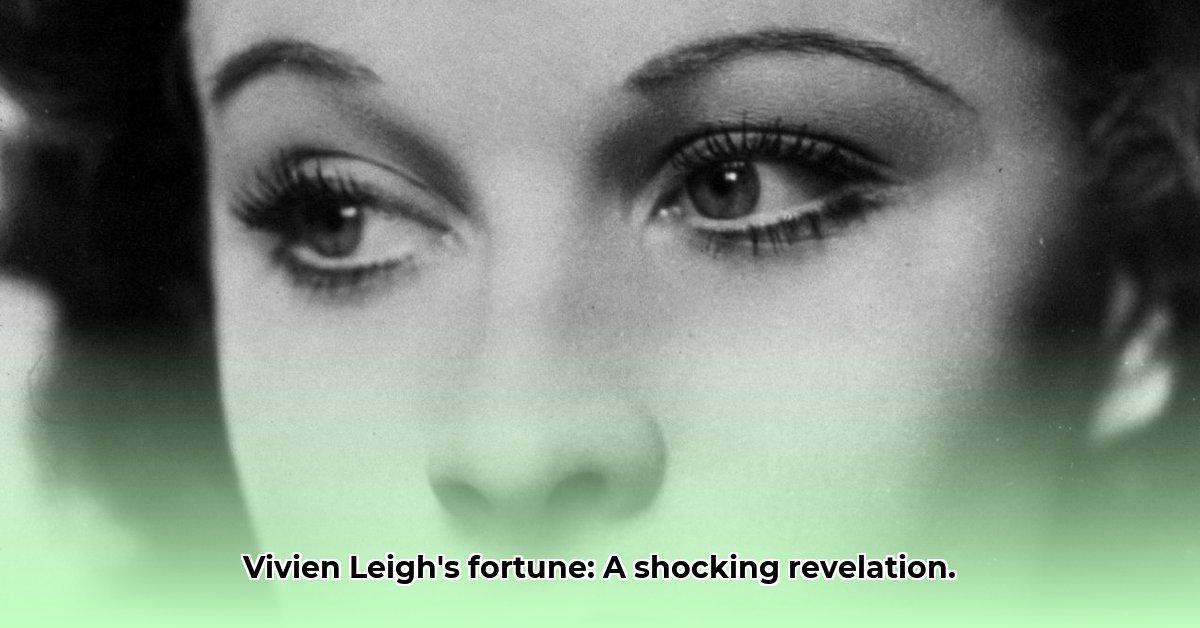
Vivien Leigh. The name itself whispers of incandescent beauty and unforgettable performances. She was a star, dazzling audiences in iconic films like Gone With the Wind and electrifying stages with her portrayal of Blanche DuBois in A Streetcar Named Desire. Yet, her life, far from a simple narrative of glamorous success, was a complex tapestry woven with threads of extraordinary achievement and heartbreaking personal battles. This essay explores not just her net worth—estimated, conservatively, to be around $10 million adjusted for inflation—but the full spectrum of a life lived intensely, a life that continues to captivate and inspire.
Born in Darjeeling, India, in 1913, Vivien Leigh's early life hinted at the dramatic flair that would define her career. Her passion wasn't merely a youthful fancy; it was a driving force that propelled her to the London stage and quickly captured the attention of critics and audiences alike. Her innate charisma, a captivating blend of fragility and fierce intensity, set her apart. This wasn't simply talent; it was a mesmerizing presence that commanded attention. Her early successes were stepping stones on a path towards global stardom, foreshadowing the enduring legacy she was to create.
The world truly recognized her brilliance with her portrayal of Scarlett O'Hara in Gone With the Wind. This wasn't just a film; it was a cultural phenomenon, and her performance became legendary, indelibly etched in cinematic history. She didn't merely act; she became Scarlett, embodying her strength and vulnerability with a thrilling authenticity. This iconic role propelled her to international stardom, cementing her place among Hollywood's elite. But the enormity of her success was only one aspect of her story. Was this success solely attributable to talent, or did other factors play a role? The answer, as we will see, is multifaceted.
Beyond the glittering lights of Hollywood, Vivien Leigh's artistry shone even brighter on the stage. Her performance as Blanche DuBois is a masterclass in acting, a nuanced and heartbreaking portrayal that remains powerfully relevant today. The critics raved; audiences were mesmerized. These unforgettable performances, which earned her two Academy Awards for Best Actress, are a testament to a rare and irreplaceable talent. This commitment to her craft underscores the depth of her artistry, extending far beyond mere showmanship. What, then, made her performances so compelling? Was it simply skill, or did something deeper contribute to their enduring impact?
However, the brilliant radiance of her career was often dimmed by persistent shadows. Vivien Leigh lived with bipolar disorder, a condition that profoundly impacted both her personal life and her professional journey. These weren't simply periods of sadness; they were intense episodes of emotional turmoil that significantly affected her ability to maintain consistent work. Yet, paradoxically, her creative spirit often flourished even during these intense periods, resulting in some of her most memorable and powerful performances. Her struggle underscores the complexity of her legacy and invites a sensitive understanding of the challenges she faced. How did her condition influence her artistic expression? This remains a subject of ongoing study and debate.
Further complicating her life, Leigh battled tuberculosis, a devastating illness that added another layer of difficulty to her already challenging existence. This wasn't a minor ailment but a serious condition that tested her physical and emotional strength. Her continued dedication to acting, in spite of these obstacles, is a testament to her indomitable spirit and unwavering commitment to her craft. The glamorous image often belied the very real and often debilitating struggles that she endured.
While her estimated net worth of approximately $10 million (adjusted for inflation) offers a glimpse into her financial success, it pales in comparison to the true measure of her wealth: her lasting contribution to the world of acting. The real treasure is not found in bank accounts but in the enduring legacy of her captivating performances, the indelible mark she left on cinematic and theatrical history, inspiring generations of actors. Her impact is immeasurable, transcending the limitations of monetary value.
Vivien Leigh’s life was a complex narrative of undeniable talent, breathtaking beauty, and profound personal struggles. Her story serves as a poignant reminder that even the most celebrated figures grapple with their own demons. She was a multifaceted individual, a brilliant actress whose life remains a fascinating blend of triumph and tragedy, permanently enchanting and deeply sorrowful. It is a story that warrants far more than a mere numerical assessment.
How Did Vivien Leigh's Bipolar Disorder Impact Her Acting Career?
Key Takeaways:
- Vivien Leigh's extraordinary talent was intrinsically linked to her bipolar disorder; her intense emotional capacity, a characteristic of her illness, fueled many of her most captivating performances.
- However, this same intensity often disrupted her professional life, leading to missed performances, project delays, and hospitalizations, ultimately influencing her overall career trajectory.
- The demanding nature of Hollywood, with its intense pressures and public scrutiny, likely exacerbated her condition, demanding a delicate balance between self-expression and self-preservation.
- The limited understanding and treatment options available for bipolar disorder during her lifetime further complicated her struggles, underscoring the challenges faced by artists with mental health conditions.
- Leigh's legacy highlights the need for increased support systems and a more compassionate understanding of mental illness within the entertainment industry, emphasizing the importance of recognizing the intricacies of creativity and illness.
Vivien Leigh's life, a captivating blend of brilliance and tragedy, offers a profound study into the intersection of artistic genius and mental illness. Her story prompts critical reflection on how society perceives and supports those navigating the complexities of both creative expression and mental health challenges.